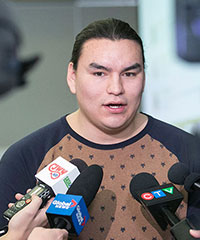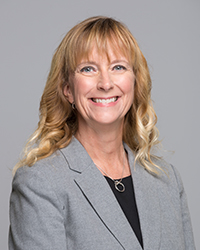U of S builds on foundation for reconciliation
For Dallas Fiddler, it’s vital that the University of Saskatchewan is aware of the issues Aboriginal students face just to make coming to class every day a reality.
By Henrytye GlazebrookAs president of the U of S Indigenous Students’ Council, Fiddler is uniquely positioned to understand those struggles better than most. And he’s hopeful that the university is taking another step forward in understanding and reconciliation.

“The university is leading in this area,” he said. “When you’re leading in this idea of reconciliation, you’re moving into the uncomfortable. When we’re moving into the uncomfortable, we’re bound to expand the narrative that the people of Saskatchewan may have.”
Leading means forging new paths, and Fiddler is confident initiatives like the recent U of S Building Reconciliation Forum mark a bold stride forward. He described the March 7 event positively and hopes it has brought to light issues of importance to Indigenous students, such as a need for more scholarships and the challenge of leaving home to attend university in a new city.
“We’re moving in a direction that’s going to be very positive for future generations in Saskatchewan,” he said. “First Nations, Métis and Inuit are one of the fastest growing demographics in Saskatchewan, and I think the institution that we have here is going to be a leader and other institutions are going to follow suit.”
Plans are to make the U of S Building Reconciliation Forum an annual event. It is intended to give feedback both for the university from the Indigenous community and in the reverse direction, providing a platform to discuss initiatives on campus.

“It’s about speaking to what we’re thinking about in the College of Law or in arts and science or any of the six colleges that spoke in the teaching and learning session at the forum,” said Patti McDougall, vice-provost teaching and learning. “It’s partly about showing what we’re doing, but it’s also about hearing back through questions and comments, or during the networking sessions.”
McDougall received great feedback on the forum, which 200–300 people attended in-person and another 800 watched via live stream, and said there are already plans to build on its success for future years. Ideas being floated include developing a session on how to be an ally to Aboriginal interests and to create opportunities to address challenging issues raised by attendees in the forum’s question periods.
The event may also expand from its current, largely internal, format to include more voices from Indigenous community members beyond the university, whom McDougall said are vital when discussing reconciliation.
“None of what we’re aiming to do can be accomplished without Indigenous community members, including elders, knowledge keepers and leaders helping us to figure out the directions to move in,” she said.
McDougall said she’s proud to hear Fiddler’s perspective of the U of S as a leader, adding that it is a view she’s heard echoed by external contacts at other universities.
“It is so important to be seen as leaders on something like this,” she said. “It’s a wonderful feeling, and one of validation that maybe— just maybe—we’re going in the right direction. We are learning as we go, and it will take time to get this right, but we’re committed to getting it right.”
In Fiddler’s mind, a certain amount of patience is expected when a topic as important as reconciliation is concerned. He knows that no true change comes easily, but he’s happy that his university is leading the charge.
“I think it shows the progress and the steps that the U of S is taking toward reconciliation,” he said. “We seem to be one of the first institutions to be taking major steps, and along with those movements we are going to face some challenges and barriers because we’re new to this. But that’s expected.”

